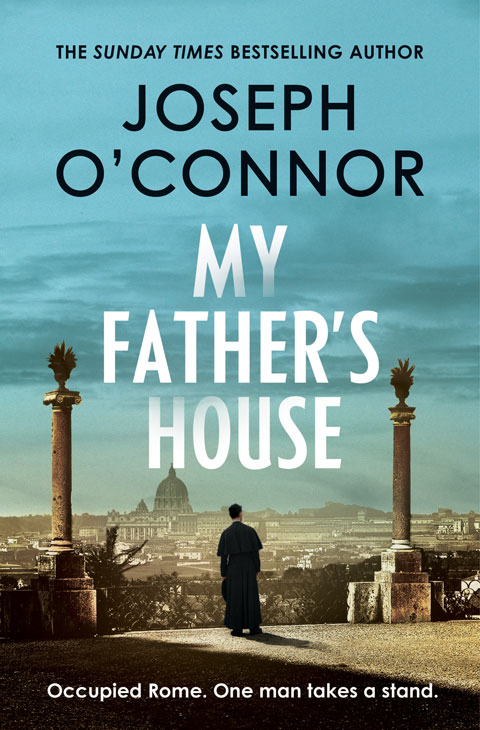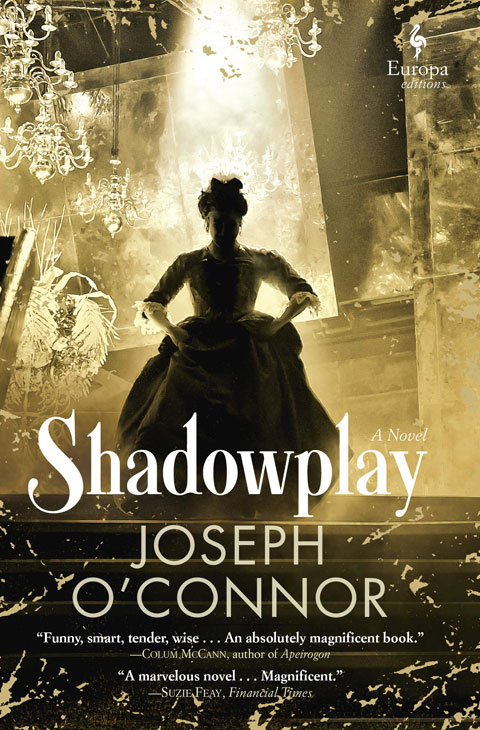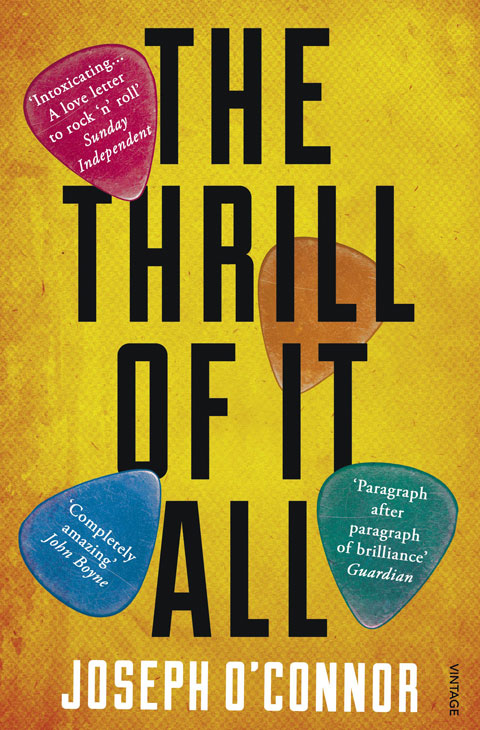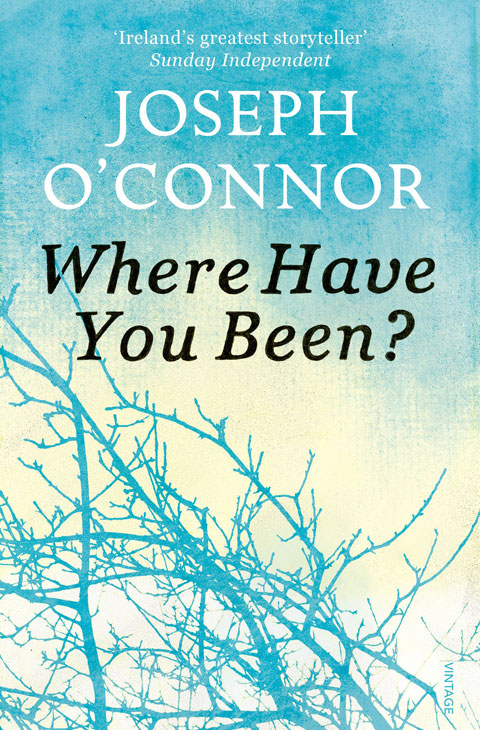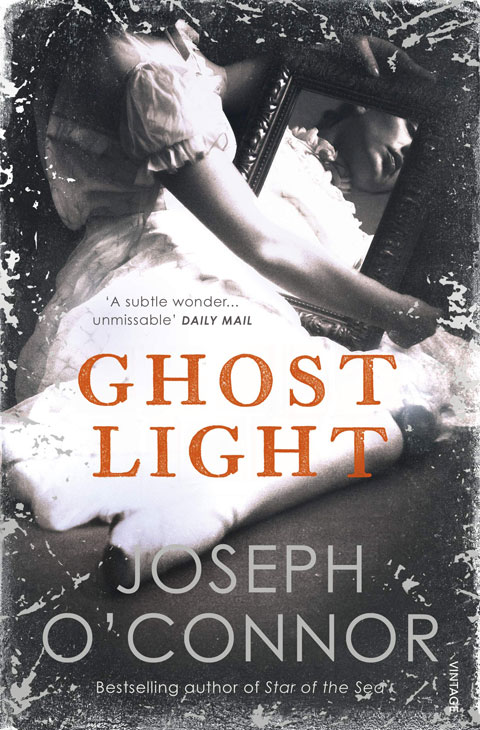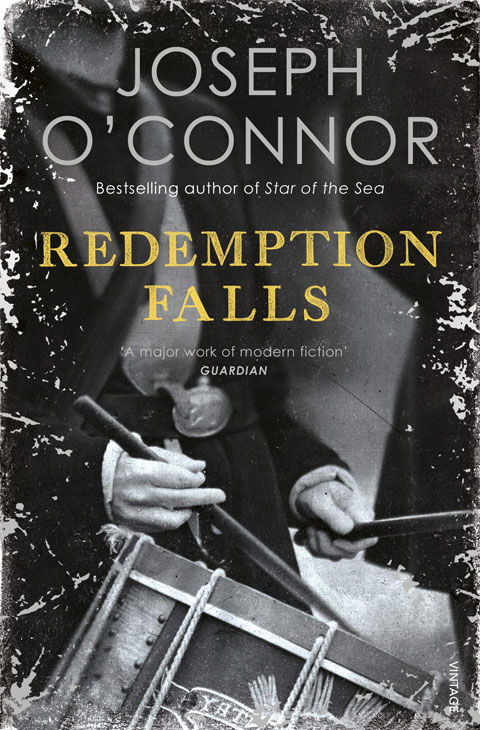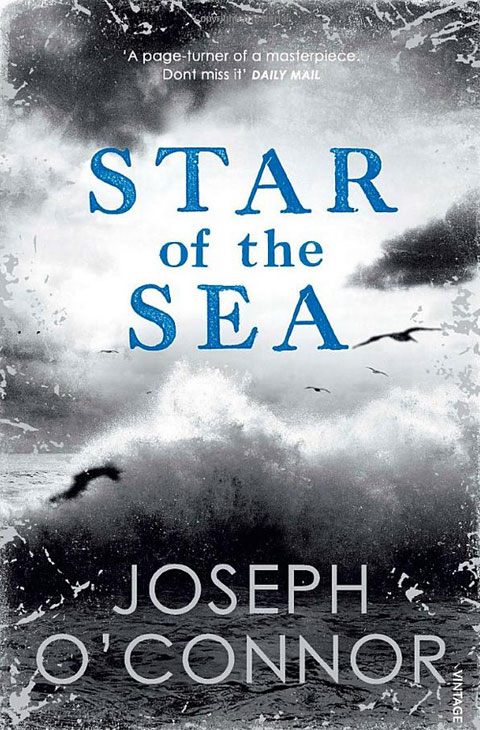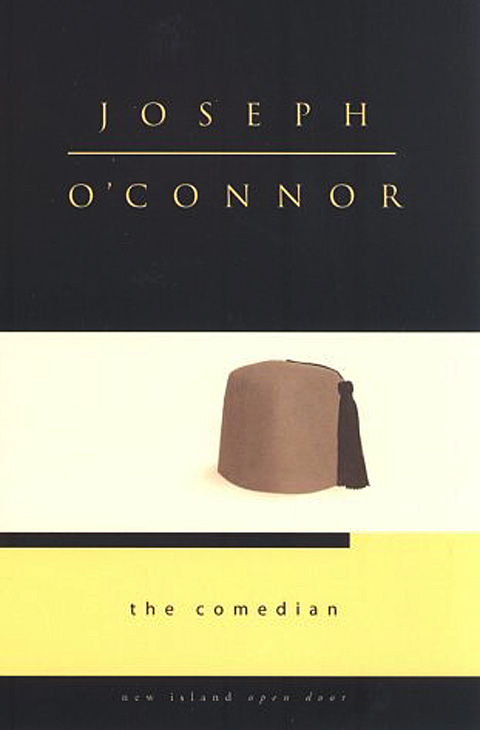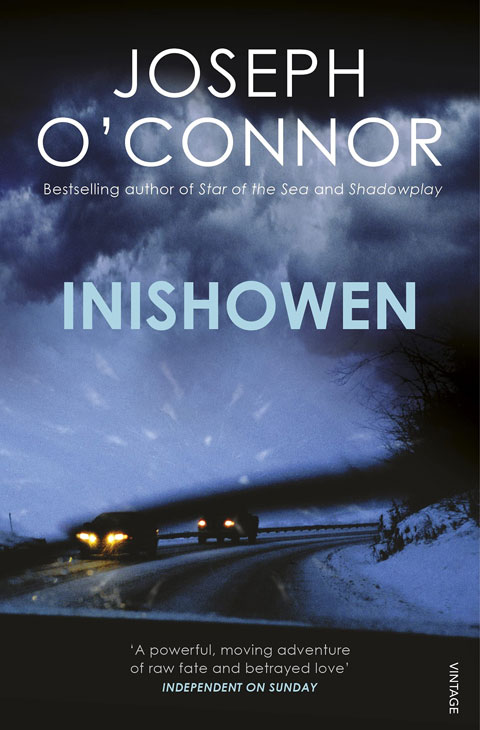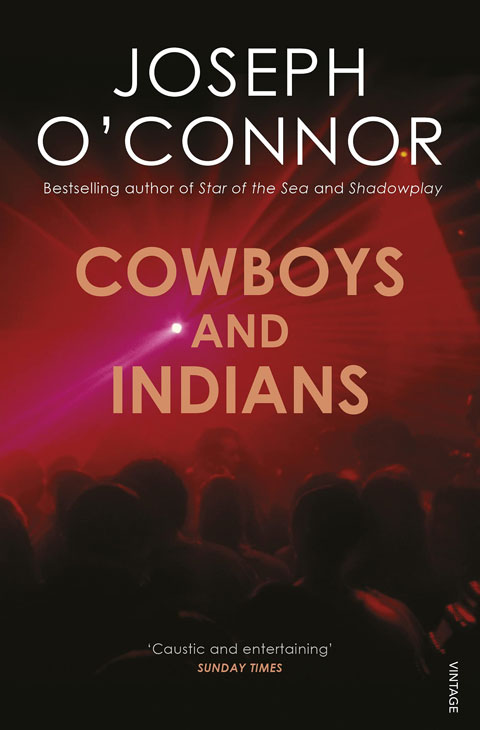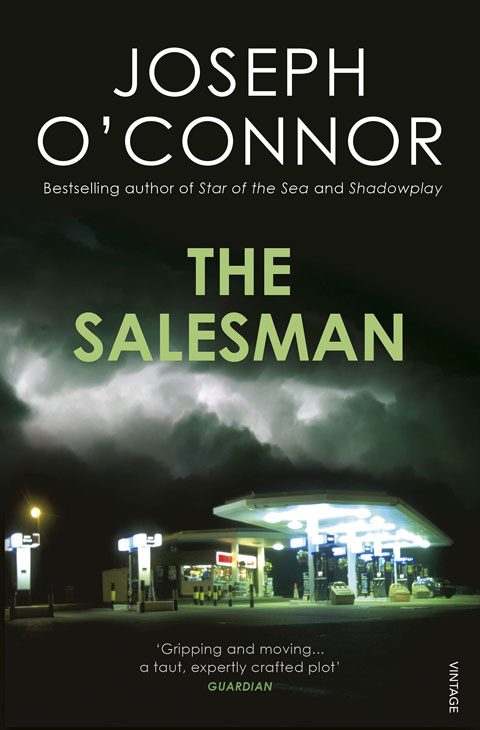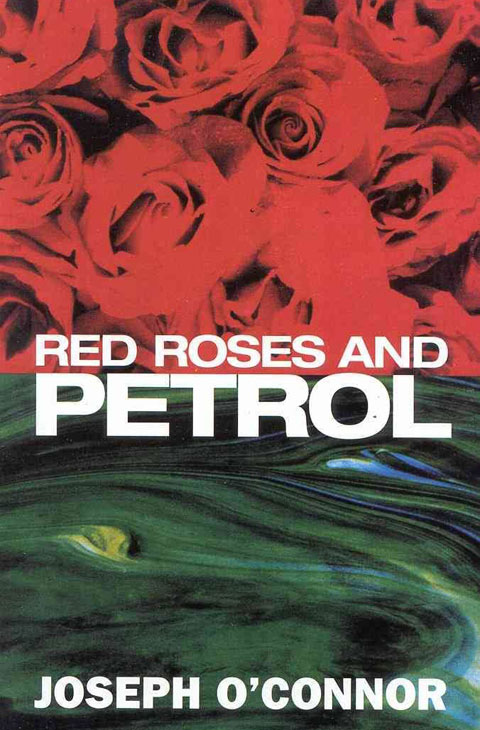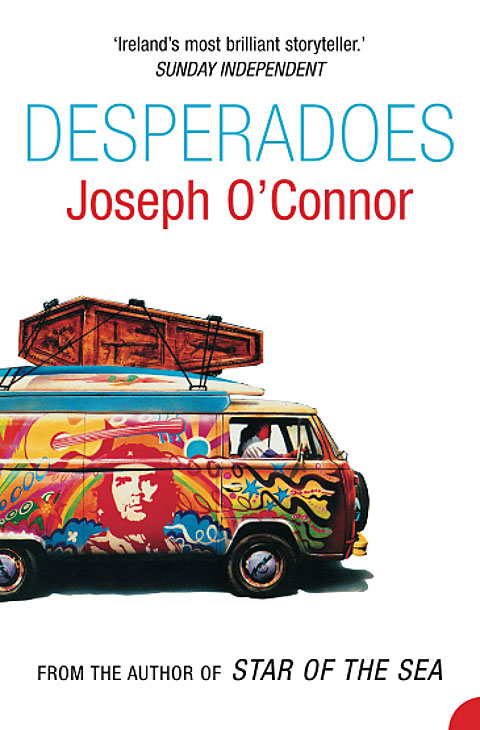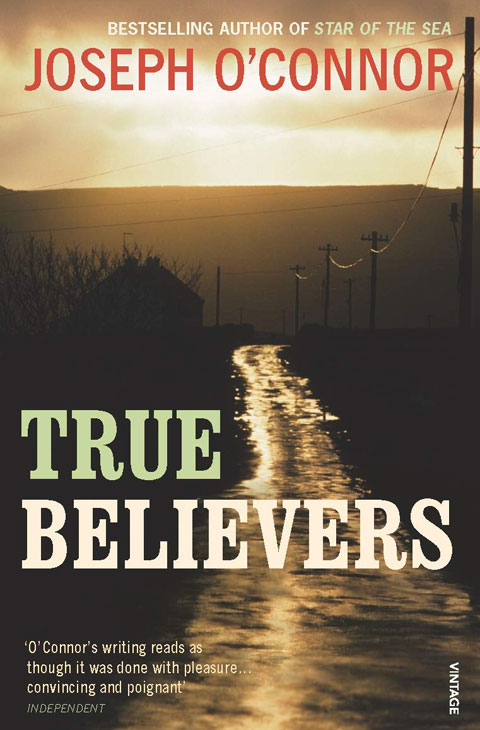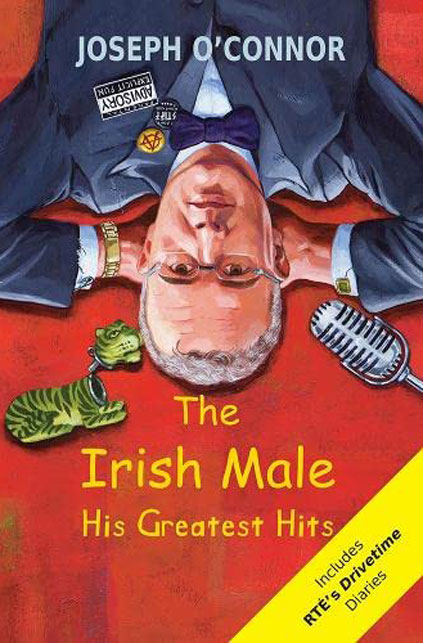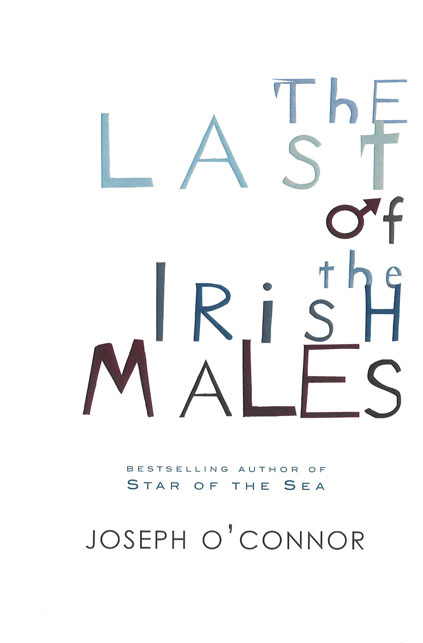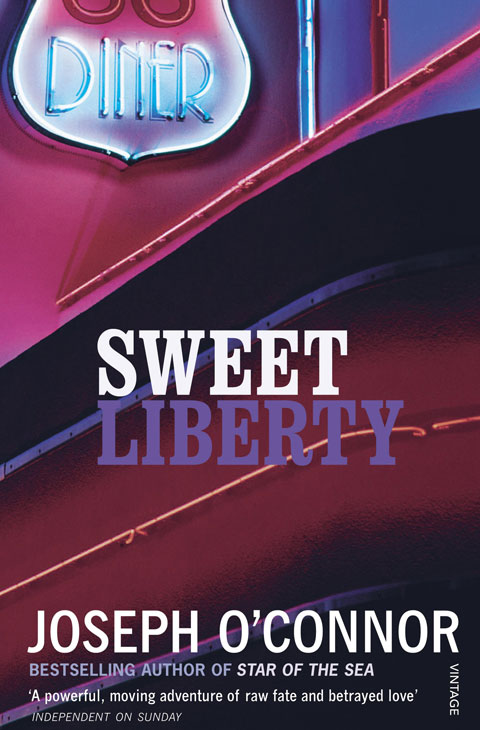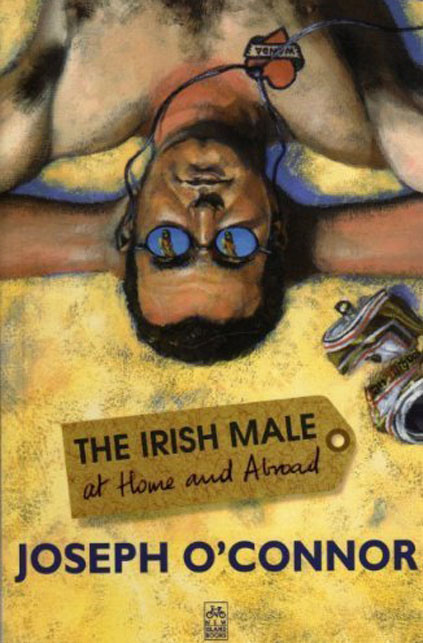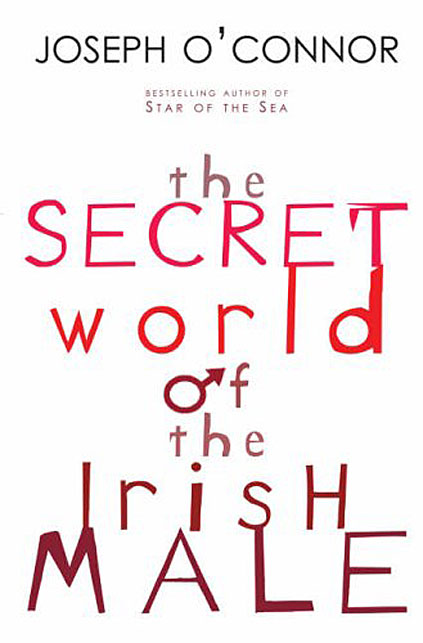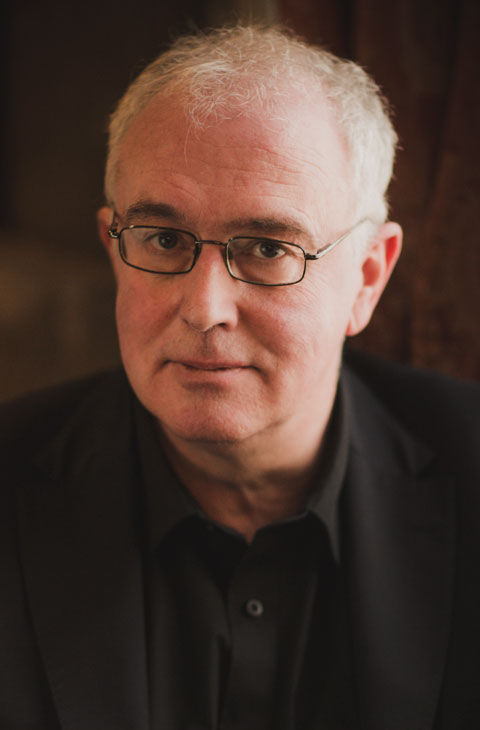
MISCELLANY
Essays, Reviews & Memoir
Click on the titles below to read the relevant content.
*****
A TRUE IRISH HERO
Joseph O’Connor on his novel My Father’s House and the brave man who inspired it.
*****
I can’t remember the first time I heard the story of Monsignor Hugh O’Flaherty (1898 – 1963), but I think it might have been in Listowel. I’ve been attending the world famous Writers’ Week on and off for thirty years, since my very first efforts at writing. At some point, late one night, someone told me about Hugh O’Flaherty and the Escape Line he organised and led in Rome during World War Two. Over the years, I researched and read more about him. I was always more amazed by his legacy.
Hugh O’Flaherty’s heroism is both gripping and inspiring. It always had the makings of a tense psychological thriller, and that’s what I hope I’ve written. A novel in the same vein of my Star of the Sea. But there are other nuances and meanings to his story.
Born in republican Cork, brought up in Kerry, the place he always called home, he came of age around the mistrust of England and in particular, English soldiers, that was one understandable and tragic bequest of the Black and Tans. Yet he came to live insistently by his own moral code, even when faced with the threat of death, and at the risk of being ostracised by his Vatican superiors.
In siding with the British prisoners to whom he was called to minister in the fascist prison of war camps in Italy, and in assisting thousands of them to safety when they escaped and fled into Rome, O’Flaherty revealed himself as a person who wouldn’t blindly follow orders, whether they came from friend or enemy. Complaints were made about him by the Irish government, whose policy was strict neutrality, but he ignored them, saving 7,000 escaped British and American prisoners from death.
In this he was assisted by a small band of remarkable friends, several of whom came from very different backgrounds and faiths. There was Sir Francis Darcy Osborne, Britain’s ambassador to the Holy See, a public-school educated member of the higher echelons of British society, who had at one time, so it is said, been in love with the late Queen Mother. He and Hugh became close friends and co-conspirators. Another member of this hugely impressive crew was John May, a Cockney, Sir Francis’s servant at the UK embassy. Also assisting the Escape Line was Delia Kiernan, who will be known to fans of Irish folk music and balladry as the singer Delia Murphy. Married to Ireland’s senior diplomat in Rome, she quietly flouted Dublin’s insistence on non-involvement in the war, showing tremendous personal and moral courage. There were other leaders, too, some of whose names we will never know: nuns, priests, everyday working-class Romans, communists, partisans, students. All were united by their work for humanity, always done at grave personal danger. Hugh’s priesthood would not have saved him. The Gestapo in Rome, led by the ruthless Herbert Kappler, used torture, intimidation and murdered several Roman priests. Hugh was well aware of the peril he was facing, yet he faced it. In the murky world of wartime, no doubt he knew, and perhaps dealt with, double agents and imposters of various sorts. What kept him steady was his faith, his remarkable instincts, and his willingness to disobey authority when necessary. Born in the Rebel County and raised in the Kingdom, Hugh O’Flaherty was nobody’s fool.
His personal papers, many of which I had the opportunity to study while researching My Father’s House, reveal a deeply humane, sometimes funny, wry, watchful man, who understood how the organisation that is the Catholic Church worked and was able to sail carefully but effectively around archipelagos of political intriguing. He has a lovable affection for life, for sport, including boxing and golf, even for the occasional punt on the Irish sweepstakes, and enjoys hearing all the gossip from back home in Kerry. The beautiful statue of him by Alan Ryan Hall in Killarney, placed there in 2013, captures something of his vigour, grit and joi de vivre. Maybe a hint of his cunning, too, in the half smile. One of his sayings, ‘God Has No Country’ is inscribed on a nearby wall. A message the world still needs to hear, alas.
The Hugh in my novel is a fictional character, inspired by the real man. The Hugh O’Flaherty Memorial society (www.hughoflaherty.com) does a fine job of celebrating his achievement, and there have been articles, nonfiction books, and a documentary, ‘Pimpernel Sa Vatican’. made by his grand-niece Catherine O’Flaherty for TG4. For my own part, I’ve taken license with characterisations, events and chronologies, in a work of the imagination. I emphasize that my Hugh is my version, and I have filled in several silences. My Father’s House isn’t intended to be a textbook or biography, but I hope that my novel does conjure the essence of this wonderful man, who has been part of my life for many years.
Hugh O’Flaherty’s story is a tale of borders and boundaries, how the Nazis painted a white line around Vatican City to keep him inside, how he would taunt them by meeting his contacts in St Peter’s Square itself, in open view of the German sentries. He and his friends risked absolutely everything, even the destruction of his beloved Vatican City, the physical embodiment of his faith, for what was right.
His stubborn, quiet defiance – some might say an Irish trait, even perhaps a Kerry one – was magnificent. That this amazing man was one of us, a hero when it was hard to be, is cause for pride and thought. And in our own time, when once again there is far too much false focus on the things that supposedly divide us – nationality, tribe, religion, belief – it’s good to be reminded that Hugh O’Flaherty and the small, brave band of women and men he gathered around him stood up to the world and said no.
WAGING HEAVY PEACE: A HIPPIE DREAM
by Neil Young
*****
Review by Joseph O’Connor
One day, two years ago, Neil Young broke his toe. Recovering, he decided to write a book. At 497 pages, and 68 chapters, the result is a sort of quadruple album. To argue that it might have been better at about half its published length would be to miss the point, perhaps.
Young writes plainly and often directly, in the sort of baggy patchwork style that wouldn’t surprise any admirer of his jagged and open-hearted music. A curmudgeon might feel that the book is not wonderfully edited, but perhaps it’s a brilliantly effective simulacrum of being alone in a room with a sexagenarian rock-star who, back in the day, ingested more drugs than Lord Byron. (The author is now clean, he assures us.) ‘Waging Heavy Peace’ skips across time, moving back and forth. He rambles disconnectedly through his memories, showing scant regard for the attractions of chronology. Endearingly, he often comments on the difficulty of writing what you’re now reading. This is a chronicle that is always aware it has an audience.
If Young, a brilliant musician, is not a naturally gifted writer of prose, his account of a childhood touched by sickness is affecting. As a shy and lonely boy growing up in small-town Canada he suffered polio and its painful treatments. The divorce of his parents must have been more harrowing than he permits himself to admit here. But his tact on the point is in its own way revealing. This is no tell-all memoir, no attempt to make headlines or settle scores. Young writes with scrupulous dignity about those he has loved. The book contains few accusations. The tone, almost throughout, is that of a down-home, plain-speaking family man who admired certain aspects of the Reagan Presidency and is nobody’s standard-issue rebel. At other points it veers into more typical rock and roll territory. There are several accounts of driving through Malibu ‘amped on coke’ with ‘beautiful hippy girls’, an image that will seem bittersweet to those many of us for whom Neil Young’s music summons up the nights of our youth: the damp Rathmines bedsit, the six-pack of Harp and an eternal Good Friday of spotty celibacy.
Young claims, believably, not to understand song-writing. It’s something that happens to him. Thinking about it is fatal. Like an old bluesman or a Sean-Nos singer, he believes the artist is channelling spirits. In an era when the ultimate aim of certain young musicians seems to be to have their own brand of aftershave or bra, his once derided hippyism now seems radical. He was punk before Johnny Rotten was born.
That said, he seems unaware of piquant ironies that even the fondest reader will notice. A noted
ecologist, Mr Young always celebrated the release of his albums by buying a gas-guzzling vintage car. There are the usual celebrity laments about what ‘we’ are doing to the planet and not a lot of personal responsibility on that score, or on others. To be fair, he has invested heavily in developing technologies for cleaner fuel. But if you don’t like being lectured from the vantage point of a personal jet, you may find yourself skipping certain passages.
Several of his relationships with women are sketched with almost telegraphic brevity. But his marriage to the folk singer Pegi Young is beautifully described. Clearly, she saved his life. And the book bursts into colour when he writes about his children. Ben, born quadriplegic and with cerebral palsy, is ‘my hero, my warrior’, a constantly moving and life-affirming presence throughout this chronicle.
The book is sometimes gently funny. Young tells us that the song ‘Horse With No Name’ by the 1970s band America was so obviously influenced by his own work that his father, on first hearing it, thought it was by Neil. The three great groups to which Young was central – Crazy Horse, Buffalo Springfield, and Crosby, Stills, Nash and Young – are recalled with the coolness of the insider. He is immensely generous to his fellow musicians. Behind that, some will sense a subtle reluctance to be truly open about the no doubt mysterious processes involved in being a rock and roll Titan. ‘I want to love you, but I get so blown away,’ he wrote in one of his masterpieces, ‘Like a Hurricane’ (a track recorded in one take, he points out, only intended as a demo for his band). This book is no hurricane, rather a smokescreen of recollections offering themselves as a story that is perhaps intended to obscure before we glimpse the contradictions that made it. On that point, it does a wonderful job.
This is not a work for admirers of Bob Dylan’s brilliant Chronicles: Volume One or Patti Smith’s masterfully evocative Just Kids, in that it regards itself as an opportunity for the assemblage of interesting afterthoughts rather than a chance to make something more resonating than a rock star’s dreamy memoir. But there are deeply touching sequences too. Paul McCartney, Bruce Springsteen and ‘my friend Bob’ make shadowy appearances. Departed friends are recollected with sorrow and affection. It comes as a surprise to learn that the man who wrote such wild sixteen-wheeler riffs as ‘Into the Black’ and ‘Keep on Rocking in the Free World’ is an obsessive collector of model trains. Indeed, he positively revels in a kind of geekiness, waving it in your face, like Lady Gaga brandishing a steak at a Vegan.
Some of the book’s most likable writing is about guitars. He writes about ‘Old Black’, his 1952 Gibson Les Paul, with the tenderness of an old cowboy praising his sidekick. In the pantheon of great rock guitarists, there has surely never an earthier one. Young, in life a gentle and unassuming presence, on stage with a guitar becomes rock’s Incredible Hulk, a player who reminds you with earthquake power that this instrument is a lump of wood with metal wires attached and fifty thousand volts flowing through it. There are moments when the sardonic might feel his descriptions become a bit Spinal Tap. Young says the audiences at gigs by his band Crazy Horse were fortunate to feel ‘the force of the Horse’, a phrase only a legend could risk without attracting a beating. But the excesses are easily forgivable.
There is passionate, heartfelt railing against the introduction to the marketplace of digital sound – a CD, he tells us, has only 5% of the sonic inclusiveness of vinyl – and against the loathsome arrival of the i-pod’s ‘shuffle’ function, in this reviewer’s opinion the worst thing to happen to popular music since Rolf Harris covered ‘Stairway to Heaven.’ A generation of music fans has been robbed of the immense pleasure and challenge of discovering an album’s structure, the rhythms and chimings not noticeable on first listening. This is spreading through the culture like a ghastly virus, so that soon we will be able to download the bits of a novel some critic told us we might like and leave its other bits lonely in cyberspace. In the name of choice, we are enslaved to the immediate. But that is another story, worst luck.
Neil Young fans, and there are millions of those (this reviewer strongly included), will relish this elusively written and beautifully illustrated book for the unique story it almost tells. Those who feel the memoir can sometimes be more than an ultimately self-concealing genre may be left with the faintest regret. But the good thing is that many of them will be coaxed back to the songs, those strange and beautiful stories of fractured, hopeful lives as they were lived in the era of the long-playing record. This is a book by one of rock’s few enough truly important artists. The fact that he finds himself elusive as the rest of us find him shouldn’t necessarily be a surprise or a problem. Long may he run.
Some of Ireland’s wisest literary commentators have been troubled in recent times by a reticence they perceive among the country’s writers of fiction on the matter of the new prosperity. The novelists have told us nothing — thus runs the argument. An Irish Amis has proved reluctant to appear.
Like most debating stances, it obscures as much as it reveals but its assumptions are more enlightening than its conclusions. Mass-market fiction, the historical novel, the thriller, the crime novel, the stand-up comedy routine, the pop lyric, the rock lyric and other incarnations of genre-based storytelling have not been adjudged worthy of critical purview, no matter their level of engagement, often remarkably direct, with the now deceased Celtic Tiger. Where, oh where, is our Bret Easton Ellis? And where is our Bonfire of the Vanities? You sometimes get the feeling the vestals of the flame may have been looking in all the wrong places. For Anne Enright’s Taking Pictures, Colm Toibin’s Mothers and Sons, Roddy Doyle’s The Deportees, Claire Keegan’s Walk the Blue Fields and Philip O’Ceallaigh’s Notes from a Turkish Whorehouse have each implicitly claimed a power for the literary short story to speak of its complex times. Now comes an outstandingly accomplished debut collection from Irish émigré Gerard Donovan. It might persuade those who have been waiting for the epic of affluent Ireland that size isn’t everything after all.
Colm Toibin wrote some years ago, in a witty allusion to Joyce’s ‘The Dead’, that ‘snow was general over Irish fiction.’ Anyone who grew up reading Irish short stories would smile bleakly with recognition at the metaphor. There was lyricism in the writing but it sometimes blanketed the actual landscape you suspected might be lying beneath. Donovan, the latest accomplished Irish novelist to enter the snowstorm – his novel Julius Winsome is an extraordinary achievement – has no truck whatever with strategies of concealment. His stories are meltingly beautiful.
This is an Ireland of traffic, of suburbs and over-pricing, of ‘pink and blue neon signs, huge hotels standing alone till more business built up around them, and then the rabbit-cage houses.’ Rural idylls are unavailable, the stuff of daytime television. ‘It was getting on in the day and after work. Dinners were ready, lights flooding rooms. The afternoon dramas like Emmerdale Farm were at an end, and soon it would be time for the news.’ Interestingly, the city exerting its magnetism on the characters is usually Galway, not Dublin, and subtly subverted images of the Irish west abound. ‘Play some national songs,’ says one character. ‘Let’s hear some patriot songs.’ This plea has been caused by a sentence Yeats and Synge could never in their wildest nightmares have imagined. ‘I declare, my father said holding the guitar, I love Waylon Jennings.’
The writing crackles with truthfulness, a piercing acuity. A troubled husband wonders ‘what kept any couple together, what preserved a marriage from the people in it?’ A surly construction foreman ‘wore impatience in the guise of curiosity.’ The winter sun is ‘a pale yellow circle pressed like a fingertip against the ice on the bedroom window.’ A man urinates ‘to such relief that he could have written about it.’ In the wrenchingly poignant title story, set at a charity fundraising race, a businessman’s ill-considered sprint becomes an understated but continuously deepening metaphor, not only for his life but for the fervency of a society that tried running before it had learned to walk. The literal presence of the ancient past is approached with immense skill in ‘Archaeologists’ (one of several pieces in which images of archaeology figure), a troublingly prescient story set in an Ireland whose real-life politicians wish to run a motorway through the ancient valley of Tara. Indeed, cars are the setting for many important scenes in this exquisite collection, imaging the paralysis and social separation of their gridlocked occupants as poignantly as Joyce’s boarding-house rooms once did. In ‘By Irish Nights’ — for this reader the only unsuccessful story – cars almost acquire the status of characters: ‘In the houses they pass some are not yet dreaming…Across the country, from Donegal to Tipperary and down to Kerry, the roads have begun to fill, coast roads, roads through small towns, roads widening into the midlands, narrowing into cities.’ Parallels with Joyce’s ‘After the Race’, an earlier Irish story about cars, seem to suggest themselves before disappearing like tail-lights in fog. ‘The Summer of Birds’ is a heartbreaking story, as perfect as a William Trevor miniature.
Much more than a book about the Celtic Tiger (although it is certainly that), this is a collection about the anxieties and sublimated fears of the Ireland that rejected the Lisbon Treaty in June, despite being commanded not to do so by its establishment. There’s a sense of having come too far, of something precious being lost, doing battle with a simultaneous and equally adamant mistrust of the past. Is Ireland European? A kind of America? Or both? What did the good years mean? Images of maps and cartography occur frequently in Donovan’s writing. It’s hard to avoid thinking we’ve pulled up a crossroads, the place where rural Ireland’s young people used to court and dance, but where the bluesmen of another storytelling tradition, fuelled by many a myth, sold their compromised souls to the devil. This is not the first fiction about Ireland’s economic boom but it may well be the first to see it for what it truly was, in all its shimmering newness and garish strangeness, its ugliness somehow related to its beauty. That Gerard Donovan manages to unearth such resonant grace from that paradox is remarkable. This is an important and haunting collection.
Roseanne McNulty, forgotten centenarian, long-time resident of the Roscommon regional mental hospital, is facing an imminent upheaval. The decrepit Victorian institution is soon to be demolished, leaving its residents displaced in a starkly changed modern Ireland that has all but buried its violent origins. Attempting to organise her memories, some reliable, others shifting, she embarks on the writing of a chronicle.
Her account forms the main part of Sebastian Barry’s compelling novel, in which Roseanne’s testimony interweaves with that of her psychiatrist, Dr Grene. A man who feels fatherly, “even motherly”, towards his patients, he is plagued by memories of an uneasy marriage. He and his late wife were “like two peoples that have once committed grave crimes against each other, but in another generation”.
Barry writes about loss, broken promises, failed hopes. This novel of crippled perspectives and ducked responsibilities comments on his 1998 book The Whereabouts of Eneas McNulty, a story about “scraps of people, blown off the road of life by history’s hungry breezes”. In addition, The Secret Scripture offers itself as a kind of thematic cousin to his Booker-nominated masterpiece A Long Long Way and his award-winning stage play The Steward of Christendom.
Barry, in effect, is making one operatically extended fiction comprising discrete but interrelated novels and plays, often inspired by his real-life ancestors. It is an astoundingly ambitious body of work, which establishes that family trees, like national histories, sprout “the strange fruits in the cornucopia of grief”.
He writes with a dramatist’s timing and a poet’s exactitude. (One character, a priest, is “cleaner than the daylight moon”; panic is “blacker than old tea”.) The result is a richly allusive and haunting text that is nevertheless jagged enough to avoid the anaesthetic of high lyricism. This is a novel in which swans enduring a rainstorm are “like unsuccessful suicides” and the accents of Sligo corner-boys are “like bottles being smashed in a back lane”. The setting is the western Ireland of traditional literary depiction – subtle Yeatsian references abound in the novel – but Barry’s destabilising of inherited images gives the book a punkish energy as well as fiery beauty.
Roseanne’s voice is urgent, colloquial, strange, a song of insinuations, non-sequiturs and self-corrections. It sifts the troubled memories it purports to be organising while always keeping faith with the impossibility of the task. Shards of stories intrude; fragments of lost narratives jostle. Half-forgotten quotations and scraps of ancient folklore blow around her mind like old leaves. Is she chronicler or creator? How much is reliable? “No one has the monopoly on truth,” she points out. “Not even myself, and that is a vexing and worrying thought.”
Her turn of phrase is bleakly funny and there are warm, vivid reminiscences, for a girlhood in rural Ireland “is not all knives and axes”, but as recollection coheres into a devastating story the nature of her sufferings becomes clearer. Dr Grene is both detector and hider of truths, and he finds himself in paradoxical reversal with his baffling patient, speaking to her of his own losses and hurts. But the book is arranged and imagined with immense tact, so that it is never unbalanced by its ironies. Roseanne and Dr Grene, though hardly ever described, are incarnated with such commitment and narrative astuteness that you feel you are standing in the rain of their lives. You are reading them, not reading about them.
As often in Barry’s work, Irish history is a malignant omnipresence, its antediluvian hatreds and innumerable betrayals forming not so much a backdrop as a toxic sludge through which the characters must wade, as best they can. The terrors of civil war have led to incurable enmities, the “sad, cold, wretched deaths of boys on mountainsides”. Innocence is murdered and idealism compromised by the dirty truths of sectarianism. The newborn state professes fealty to republican slogans but its bitterest irony is that liberty, equality and fraternity have proven so viciously incompatible. Trust is unaffordable. Love is a risk. The neighbour is the assassin, the former comrade the enemy.
In this territory of “murders so beyond gentleness and love that to be even in propinquity to them was ruinous”, identity itself is contested. Roseanne, as a working-class Presbyterian and a woman, is presented both as traumatised outsider and intimate commentator, a spectator of warring men whose allegiances and concomitant hatreds will have woeful consequences for her own family. Perhaps the act of telling her story is in some sense redemptive, but behind the mistrust of patriotism are more elemental questionings. This is a novel of masculinities; the damage done by men, to women, but also to themselves.
Students of militant Irish nationalism may be tempted to read Roseanne as a sort of personification. Certainly, the image of Ireland as a forlorn old woman has for so long been central to republican iconography that the novel can be filtered through the lens of those meanings even as it cleverly subverts them. But Barry is doing something darker and more daring than image-breaking. He makes enthrallingly beautiful prose out of the wreckage of these lives by allowing them to have the complication of actual history in all its messy elusiveness. “History, as far as I can see, is not the arrangement of what happens,” he writes, “but a fabulous arrangement of surmises and guesses held up as a banner against the assault of withering truth.” His achievement in this magnificent and heart-rending novel is a kind of restitution.
This handsome, slip-cased, double-volume set of short stories contains more than a thousand pages of William Trevor’s prose, superseding his Collected Stories published in 1992. Admirers of his persuasive and scrupulously understated writing will have read many of these stories before, but the power of this unforgettably impressive gathering is in the breadth and consistency of his achievement.
From early masterpieces such as ‘Access to the Children’, ‘The General’s Day’, ‘The Ballroom of Romance’ and ‘Matilda’s England’ to the well-wrought wonders contained in his last four books, the characterisation is skilful and subtle. There is sometimes a scene of brilliantly spine-tingling unease, as disconcerting as anything in Kafka or Pinter, but generally his characters have been the ordinary lonely, lost people trying to make sense of their fate.
Whether the old curate in ‘Justina’s Priest’, the unhappy lovers in ‘Office Romances’ and ‘The Forty-Seventh Saturday’, or the middle-aged blind-daters who endure a mortifying encounter in ‘An Evening Out’, his people are recognisable strugglers. His genius is that everything they do is wholly believable, even when it is bizarre or out of character. And the hard-won compression of his careful style charges his depictions with an immense power. His ironies are sparing, organised with masterful timing, often directed at marriage or courtship. The story ‘Graillis’s Legacy’ reveals more about the demands of fidelity than does many an epic novel. And ‘The Penthouse Apartment’, a wonderful story, builds an atmosphere of almost dizzying panic.
What is remarkable about this collection is how it reveals the extent to which the touchstones of Trevor’s aesthetic were there from the very earliest stories: the crafted sparseness of description, the luminous sense of place, the extraordinarily profound insight into the depths concealed by social conversations. Each story proceeds at a kind of internal rhythm, the clarity of cadence and gracious austerity of the writing achieving an exactitude few living writers could match.
And his sense of eloquent tact animates every paragraph. He never crowds his characters or smothers them with adjectives, but allows them to incarnate themselves on the page. There is a wise, forgiving kindliness in his curiosity about human foibles, but it’s an effective strategy too, for it coaxes the reader into the story so irresistibly. He dares to leave enormous questions about his people unanswered, leaving you riveted while he slips unnoticed from the building.
A good number of these miniatures are quietly charged with the unquestioning, stoical, intoxicating sadness of so many rural Irish lives of the past. But his bleak English suburbs are conjured as evocatively, as are his hot tourist destinations from Jerusalem to Cap Ferat, and the denizens of his wrecked aristocratic mansions. He is wonderful on roads not taken, on responsibilities ducked, on guilty secrets and stunted compromises. Buildings and gardens come to life as he describes them. And he is brilliant on marriage, the tacit détentes and unasked questions that lock spouses together as powerfully as do love and fondness. He writes of one wife that something in her ‘had been smashed to pieces’. There is never a moment of false lyricism. Many of his women live in a world of choking passivity, where events can only be controlled at a price. He writes of another character. ‘She had once been Mrs Horace Spire and was not likely to forget it.’ We don’t forget it either.
Compassionate, poignant, clear-eyed, often heart-rending, these stories build into a sustained meditation on the problems that have long preoccupied their author: love lost, marital infidelity, duties of decency shirked, ageing, loyalty, self-caused loneliness. His characters become progressively more disrupted by politics as you move through the collection, but even in the stories that allude to Ireland’s sectarianism the emphasis is on people, not the slogans they live by, or die by. It is surprising to see how often imagery of childlessness surfaces in the stories, and how eerie some of the early pieces are. In tales such as ‘In at the Birth’ the ghost of Poe can be felt. Trevor is capable of seriously scaring you.
The prose is clear as water, but with so many eddying undercurrents of meaning that second and third readings yield startling new insights, and this is the greatest pleasure of this immensely enjoyable collection. What is extraordinary, looking back now at five decades of his work, is not just the restricted range of his linguistic palette – there is scarcely a metaphor anywhere in the book – but the truthfulness and scope he achieves with it.
The simplicity and authority of the writing is haunting and finally moving. Joyce is always present as an influence, not the linguistic pyrotechnician of Ulysses, but the modest and punctilious voice of Dubliners. (One story, ‘Two More Gallants’, engages directly with Joyce’s collection.) In Trevor’s work, plainness is everything, a kind of grammar as well as a worldview. It is hard to think of any writer who is better at silences, the subtle ways in which they articulate affection or power. ‘Her lipstick had left a trace on the rim of the teacup and Norah drew her attention to it with a gesture. Kathleen wiped it off.’ This moment from the strange story, ‘Sitting with the Dead’, is typical of his focused attentiveness. He mines whole histories from the unspoken, the denied. A widow remembers how her furious husband ruled by threats. ‘The time she began to paint the scullery, it frightened her when he stood in the doorway, before he even said a thing.’ And then there is the sheer grace of his sentences, the joy of recognition they bring. An eavesdropper ‘was skilled at breaking into privacies without the knowledge of the person observed; he prided himself on that, but twice, or even three times, he suddenly had to drop his scrutiny, taken unawares by having his gaze returned’.
Flannery O’Connor famously wrote that the short-story form is all about the point not understood at once, the thing half-glimpsed in a corner. It has been William Trevor’s achievement over nearly to 50 years as a writer to have shone light into those spaces with such unerring steadiness that you hardly even notice he is doing it. This is a magnificent collection, astonishing in its pleasures. The lack of an introduction is its only flaw.
It might overburden the Booker Prize- nominated Love and Summer to characterise it as Trevor’s finest novel to date, indeed as one of his greatest literary achievements, but the book is so persuasive and beautifully achieved that one is tempted to reach for superlatives. All the hallmarks of Trevor’s scrupulous style are deployed: the crafted sparseness of description, the photographically vivid sense of place, the extraordinarily profound insight into the business of being human. His awe-inspiring ability to express the most complex of realities in sentences of clarity and shimmering plainness has never been more admirable.
What I would describe as his sense of eloquent tact is present on every page. Trevor is a master at standing back from his characters. He never crowds them with his own cleverness or gets in their way but allows them to incarnate themselves on the page. There is a sort of wise kindliness in his curiosity about people and their foibles, but it’s a marvellously effective strategy too, for it draws the reader in so powerfully. He leaves questions about his people unanswered; it’s the reader who forms the picture.
The story is set in the Irish village of Rathmoye, some time in the middle of the 20th Century. A poignant figure, Orpen, a local Protestant who is not quite all there, is minded and tolerated by his neighbours in the town, as he wanders the streets, displaying pages from the archive he believes he is protecting for posterity. Summer beautifies the landscape, as much as it can, and nothing much is happening besides small-town gossip and grocery shopping.
A funeral opens the proceedings but it has a disquieting element: a stranger is noticed surreptitiously photographing the mourners. The daughter of the deceased woman, Mrs Connulty, becomes curious about the interloper, Florian, in the process becoming witness to events that will have far-reaching consequences.
The ensuing narrative is so masterfully clever and involving that it is hard not to reveal it. Suffice it to say that a deeply surprising love story is about to commence, a tale of passions kept secret even as they grow ever more reckless and the colder days of autumn approach.The book, like much of Trevor’s work, is absolutely wonderful on the subject of marriage, the evasions and tacit agreements that hold people together, as powerfully as do love and fondness.
A farmer, Dillahan, lives in a world of brokenness and grief, the guilt that he was responsible for the tragic deaths of his child and first wife as real as the fields he drifts through. Now remarried to a younger woman who came to his home as a housekeeper, he talks like a man with nothing left to say. And yet the pleasant platitudes exchanged between husband and wife, the remarks about the farm and the tasks of the household, become a sort of shorthand for much deeper emotions you suspect are always close to the surface. When those emotions do spill over, the result is a scene of spine-tingling unease.
In the work of a less skilful and subtle writer, this relationship would not be even faintly credible. Trevor makes it not only believable but achingly real and inevitable, somehow a meditation on all marriages of that era, and perhaps of subsequent eras too. No Irish writer of either gender has ever written more empathetically about women, as his previous novels Felicia’s Journey and The Story of Lucy Gault made clear. But Love and Summer has an unflagging power and quiet control of the material that Trevor has more usually achieved only in the best of his short stories.
His people live in a world of suffocating passivity, where things happen to you and can only rarely be controlled. Indeed, it’s an interesting hallmark of his dialogue and description that it is so often framed in the passive. A woman ‘had bread to get’ in the shops. A telephone call ‘was made’. These are characters who truly feel they can not affect the world, and the heartbreaking tragedy of the novel’s conclusion is brought about when one of them tries to. In a closing that brings to mind the transformative sadness of Joyce’s short story Eveline, it is accepted that the world will always do what it will, and most of us will fall into line in the end.
Quibblers will feel that the novel is almost too reticent. And it is notable that in this narrative of crazily passionate love, there is no description of lovemaking or sexuality or even desire. In my own view, this works magnificently, for as Patrick Kavanagh’s poem Advent has it: ‘Through a chink too wide comes in wonder.’ We form the love scenes in this novel ourselves, perhaps projecting on to them our own memories or wishes, rather than being browbeaten by those of the author.
Indeed, this is one of the book’s most interesting themes: how what we seek in a lover or partner is sometimes a version of someone we have lost, and how falling in love and the making of fiction are deeply related activities. But Trevor is too supple a storyteller to engage in lectures or agendas. If this novel has themes, they emerge with the delicacy and fragility of wildflowers in a summer meadow. And like those beautiful blossoms that linger in memory, this masterpiece lives fragrantly and hauntingly.
Notes from a Turkish Whorehouse, the 2005 debut collection of short stories from Philip O’Ceallaigh, garnered deservedly strong reviews and a handful of prizes. Its follow-up, The Pleasant Light of Day, will extend and deepen his already considerable reputation as an artist of extraordinary gifts. He is assiduous with words, a writer of craft and vision, and refreshingly so sparing with similes and self-announcing images that to read him is to be reminded of the power of plain prose to break into territories of the imagination. When he does use a metaphor, it bursts off the page. (‘The hoofed beast of jealous panic ran through him.’) Of the dozen stories here, perhaps ten are so perfectly achieved and exhilaratingly confident that you feel O’Ceallaigh is developing a form all his own.
There’s a focus on telling it as it is, not on saying what it’s like. In Uprooted, a story unusual for being located in his native Ireland, ‘Gulls quiver on the wind, swoop, rise again, wheeling in the updraught.’ The wind is ‘picking up the crashing swell at the cliffs of Inis Meáin, propelling it halfway across that island as salt rain.’ In Walking Away, a strange and compelling piece set shortly after a funeral, the narrator resists facile or inherited assumptions of the meaningful. ‘What foolishness, to speak of beyond, when we hardly know what we have here, on this earth, right before our eyes.’ What can be seen is always important in these vivid, measured stories. This is an author who looks at things carefully, annihilates the clichés. John McGahern wrote that any artist needs first a way of seeing. Philip O’Ceallaigh has one
This is a world where sexuality is tough, a contested ground, and the comings and goings of his hungry-hearted characters rarely yield a sense of communion. And in My Secret War he unfolds a nightmarish vision of suburban American life. ‘In the evenings, after the kids are in bed, me and Martha might drink a bottle of beer on the porch, listening to the crickets. A flag flies over our tranquil lawn, for our brave men and women in the service….Evil lies in every human heart, awaiting the faltering of our vigilance. There is no need to say much to Martha because she knows already.’ A resident of Bucharest, he conjures east-European cities with shimmering precision; these metropolises of trams and urban insularities and recently vacated pedestals. But the stories that have rural settings are brilliantly achieved too. In High Country, a hauntingly beautiful piece, a man hikes alone into the countryside beyond a provincial town, the resulting spell of self-confrontation unfolded with such exactitude and delicacy that you feel you’ve walked the same rainstorm. Revelations are few and epiphanies fewer. The trekker in the story is not quite sure of destinations but tells himself ‘the time patiently taken was what you offered up, trusting that the moment would come.’ It’s a thought that often arises on the journey through this exquisite collection, for this is work that invites slow re-reading, not in order to understand it, but so as to glimpse again the consolation of the world being described.
The standard is extremely high, which is one of the reasons why The Alchemist, an only intermittently funny satire of the work of the Brazilian inspirational writer Paulo Coelho, might have been better omitted. Fish in a barrel sometimes need to be shot, but the 32-page death they receive from O’Ceallaigh comes to feel dismayingly drawn-out. There is also a slightly cluttering inter-textuality, tropes from one story materialising in another. (O’Ceallaigh’s first book is referenced in the opening story, with a title so thinly disguised as to demand immediate recognition.) When the playfulness works, as it sometimes does, the result is an attractive complicating of the textures of the stories, a sense that they are linked like the verses of a song or the overlapping circles of a Venn diagram. This is a writer who is pushing hard at the boundaries of the form. If it doesn’t always come off, you admire his courage and purpose, his avowal that there are still things undone that words might do, in a genre that might yet come to be important for our times. In Another Country, the longest story, and thematically a central one, is a masterpiece that earns every line of its 53 pages. The prose is graceful and poised yet supercharged with the edginess that makes the events it describes unforgettable.
All in all, this is a profoundly impressive and haunting suite of stories, remarkable for being only the second collection from an author who is already touched by greatness. In one of them, a character kneels on a riverbank, ‘where the water was deeper than in other places and he could see the clean stones on the riverbed.’ It’s what O’Ceallaigh’s writing achieves, a clarification, a revealing, a pointing to realities so fundamental and unchanging that most of the time they go unnoticed. He is a scintillating talent and this is work of immense strength, but also of light, an elusive hopefulness.
A remarkable photograph appeared in the newspapers some years ago when the Swedish superstore Ikea opened its vast branch in Belfast. Pictured at the launch, side-by-side on a sofa, like buddies imitating members of The Royle Family for a giggle, were Northern Ireland’s First Minister, the Reverend Ian Paisley, and the Deputy First Minister, former IRA leader Martin McGuinness. ‘Home is the most important place in the world,’ announced the slogan behind them. You almost expected them to chime, ‘Home, my arse!’
The Irish peace process has produced daring and unlikely partnerships but David Park’s edgy and compelling new novel looks behind its uneasily constructed images. Set in an imagined future in which a Commission for Truth and Reconciliation has been established to offer possibilities of ‘communal healing and closure’, it destabilizes such terminologies and approaches. Has the language of psychotherapy anything to offer when the dysfunction has been entrenched so widely? The truth, as Wilde remarked, is rarely pure and never simple. It cuts in all directions, raising ghosts at every turn, perhaps undermining the very reconciliation it seeks to cultivate. It might set free. But it hurts.
Francis Gilroy, senior Provo turned hardworking minister in the power-sharing executive – Park has insisted all his characters are fictional — is reminder that some of Northern Ireland’s politicos, in former incarnations, wielded Kalashnikovs rather than manifestoes. Gilroy’s name (perhaps the subject of an authorial irony, for in its original Gaelic form it means ‘servant of the king’) is legendary among the Republican community he represents in the assembly. A hard man, long accustomed to nights on the run, his days are now spent in frequently gruelling engagement with the endless minutiae of governance. There are bills to be drafted, constituents to be appeased, delegations to be convinced, portraits to be sat for, comparisons with the ANC and the Sandinistas to be debated, lost dogs to be located for the voters. And there is ongoing war of glances with his inscrutable Civil Servant, Crockett, whose silences communicate volumes.
Memories of a horrific killing loom from Gilroy’s past. These days he is Minister for Culture and Children, attempting, by nightly immersions in literature, to read a way into his brief. James Joyce he finds inaccessible, Philip Larkin evocative and quotable, and perhaps nowhere in the world is the bite-size quote of poetry such a feature of public discourse as it is in post-Blair Ireland . Regular doses of Heaney are part of the roughage of self-improvement, but Yeats brings only ministerial indigestion. A pity Gilroy didn’t get to that poet’s ‘Among School Children’, in which an uneasy parliamentarian visits a classroom in an earlier traumatized Ireland, and is discomfited when ‘the children’s eyes/In momentary wonder stare upon/A sixty-year-old smiling public man.’ It’s a text that could reveal much to the Gilroys of the world but perhaps Park is correct to assume they wouldn’t notice it.
Henry Stanfield, the Truth Commissioner, the most interesting and complex character in the novel, is another kind of public man. Heading up the Commission is a wearying task, unalleviated by gloomy nights in a Belfast hotel, sometimes with a prostitute onto whom he projects his fantasies of belonging, although mostly she is ‘a ghost in his bed’. A fractured relationship with his daughter, who resents his treatment of her dead mother, offers versions of the questions he spends his days trying to answer. Can the dead be apologised to? Who is to forgive? Aren’t justice and reconciliation incompatible?
With immense narrative skill and structural deftness, Park maps the lonely road of his truth-finder through a windstorm of evasions. Driven to discover the fate of an executed boy, Connor Walshe, he senses hidden agendas, wheels within wheels, and is blackmailed by two operatives of British intelligence in a chilling scene slightly diminished by its employment of stereotypes. What was done to the terrified fifteen-year-old is the novel’s central event, so wrenchingly written that it is difficult to read and would be harder to believe did we not know that such terrors happened, and that worse was suffered, also, by so many.
In this world of ducked responsibilities and allegiances turned to hatreds, Stanfield gropes for a meaning. But collusions and complicities come in many guises; official files disappear or are altered to protect the guilty. There are stunning scenes involving a retired RUC detective, James Fenton, and others featuring Michael Madden, a former IRA member now living under an alias in America, whose escape from the past is thwarted at the very instant it appears about to finalise itself. Meanwhile, the bodies of the disappeared remain unreturned, while some of those who try to legislate a way out of the morass have the memory of blood on their hands. And nobody, in this story of men bonded by loyalty, trusts anyone. In a broken society, the straight word is suspect, the plain deal a figment, the handshake a weapon. Euphemism and prevarication are co-rulers of the wreckage, and we’re far from the flashbulbs of Ikea.
It is a brave writer indeed who ventures into such territory. The three most terrible decades in the 20th Century history of these islands have been called ‘The Troubles’, a war, a conflict, a struggle, a criminal gang-fest, a sectarian clash, and the argument over designation will long be continued in a place where language’s nuances are much scrutinized. Readers with clear-cut analyses will filter Park’s novel through the prism of their own definitions. Others will see it a remarkable tour de force, which tries to keep faith with redemptive solidarities while it smoulders with quiet rage against injustice and bigotry from wherever source they come. But finally it is not a novel about politics at all. Its preoccupation is the private, the battleground of the self, and it approaches the mysterious with a kind of unsparing simplicity that yields moments of heart-shivering beauty. Atonement, if achievable, is hard won indeed and few are exculpated at the close.
Fenton, Madden, Stanfield and Gilroy have lived in the masks they chose to put on. The time has come finally to face their choices uncovered, but the guises have adhered so that to remove them and begin again is to amputate part of the self. Park takes these four destroyed men who have come to seem strange even to themselves, and somehow, in describing them, while not fixing their brokenness, offers glimpses of what might have been, and of what still might be, too. A terrible beauty, but a powerful one for that, this is a magnificent and important book.
In 1815 in Dublin a ballad was collected that told the life of a soldier. Enlisting to fight in the Napoleonic wars, he had been maimed in action, his leg blown off, and the song tells the story of his mother’s reaction in powerfully moving ways. The song has various titles but it’s usually known by that mother’s name – Mrs McGrath. That’s all we know of her.
I thought of that mother recently, when the blue-collar Baudelaire – Bruce Springsteen – The Boss – came back to town. Irish audiences have always given Springsteen ecstatic receptions, claiming this son of New Jersey as an honorary fellow citizen. It’s clearly an induction he’s happy to have, as anyone who saw him in Dublin will know. Combining the wolfish howl of a natural-born showman with the gritty commitment of a rebel balladeer, this is Springsteen as stadium idol, at the age of 58, doing air-punching, sixteen-wheeler rock and roll with all the wild belief of a teenager. He is clearly relaxed, feels at home in Dublin. As well he would – for in one sense he is. The 19th century songs of Ireland are part of his music’s DNA, as his recording of the story of Mrs McGrath made clear. It’s a song he’s made new once again.
If folk music is America’s Ulysses, its Chaucerian saga, enriched by the darkness and desire of the blues, Springsteen’s modes of reinvention have charged it with power and given it back its authority. Standing at a microphone, alone in the spotlight, a battered acoustic guitar in his notably clumsy hands, is the last great embodiment of the American troubadour who sings an entire society into being. Archivist, lamenter, teller of stories, this is a writer of scrupulous beauty and precision, whose first-person miniatures of American life bring news not always easy to hear. His tales of star-crossed lovers, soldiers in the night, hard burdens shouldered and promises forgotten transmit the kind of magnetism encountered in traditional Irish song – that body of great art created by geniuses whose names we will never know. They are the American cousins of the Rocks of Bawn and I Wish I Was in Carrickfergus, — the songs that crossed an ocean only to be rescued in America, their broken culture saved from extinction. In Springsteen’s loving care they are reinvented; but still sung by a voice that has lost a few battles and knows it is far from home.
His characters shimmer up at you — you can almost see them, touch them. The girls who combed their hair in rear view mirrors, the boys who raced their cars through the dusk-lit streets. They came into an inheritance of foreclosures, repossessions, a patrimony of faraway battles. They are the people whose children do the dying in America’s wars, while the privileged wring their hands, or look the other way. There are still Mrs McGraths, in many broken countries, in the frightened Napoleonic empires of our world.
Springsteen, the laureate of American anxieties, has remained a relevant artist not by musical giftedness – there were always better singers and his voice has grown weaker – but by having what John McGahern said every writer needs most: a way of seeing the world. The people who live in his scrupulously realised songs are his Leopold Blooms, his Bull McCabes, his Judith Hearnes with their lonely passions; it is only that they don’t know it, have no language to say it, and nobody would be listening if they did. ‘The real war will never get in the books,’ wrote Walt Whitman, but it seeps into Springsteen’s uneasy reflections. A man who was Born in the USA – and no other country on earth could have produced him — but in another sense he could be the Irish writer we never had, the inheritor of that Dublin balladeer. For through the power of his art, its openness to the world, the waifs and strays of Irish song came home, dressed in their American clothes.
In the winter of 1989 I was living in south-east London, in the not entirely lovely suburb of Lewisham. It was a tough district that had escaped bombing in the Second World War, mainly (so it was said by some of the locals) because the Luftwaffe had looked down from their passing-by airplanes and assumed it had been bombed already.
For some years I had been trying to write, but it was not going well. Writing was like trying to juggle with mud. I would send out short stories to the literary magazines. They would come back in an unstoppable stream.
I had entered a short-story competition in the Irish Post newspaper to win a trip to Listowel for its world-famous Writers’ Week. I had not won the competition, nor had I deserved to — but to lose seemed typical enough for any young Irish person of the era. You felt you had emigrated from a country that had failed, and that the last one to leave should turn out the lights.
One evening I came home to my cheerless bedsit to find there was a message on the answering machine. The voice was familiar, as it would have been to any Irish person. It was the voice of John B Keane.
Would I come to Listowel for the festival, he was saying. ‘What matter you didn’t win. We’d love to have you anyway. I hope London is good to you. Kerry’s full of O’Connors. You probably own Carrigafoyle.’
John B Keane had rung my flat. John B Keane had dialled my number. To me, it was the equivalent of winning the Booker Prize. In all the great city of London that night, there was no happier soul than mine.
His Letters of an Irish Parish Priest and his Letters of a Matchmaker were books my grandparents loved. As a young teenager, I had read them, been amazed by their contents. In the Parish Priest book, the narrator tells a story about two lovers overheard on a Kerry beach. The man utters to his sweetheart, about to plunge into the waves, perhaps the most romantic line in the whole corpus of Irish literature. ‘Your buttocks have me intoxicated.’ There were clearly other Kerries than the one to be found in the pages of Peig Sayers’s autobiography.
But there was loneliness in the books too; there was brokenness and loss. There were people who had taken wrong turnings. Everything about his work was based on one profound insight: that a small place, in a small country, could be the whole round world and all its adventures, if only you had the eyes to see.
For some reason I cannot remember, I didn’t go to Listowel. But some years later, after my first book was published, I did go, and I met that genius of storymaking. To say he was kindly would be like saying it sometimes rains in Kerry. The weather in his eyes was always warm. Like many of the greatest writers, he was modest about his work. Not falsely – it was a modesty that came from self-assurance, I always felt — but he never seemed to want to discuss it. He would talk of other matters, with laughter and delight, and a kind of casual wisdom he didn’t seem to know he had. He would remember the names of your children, despite never having met them. He would ask to see their photographs. He would tell you they were beautiful. And what were you writing? And would you not give up the smoking? Always remember, your family is everything.
I was privileged to meet him a few times, always in the town of Listowel, a place I can never visit – and never will in my life — without thinking of his kindness and grace. But I never got the chance to say to him what I wanted. That I had seen the Bull McCabe in Lewisham High Street, shaking his stick at the traffic. That I had seen the ghost of Sive in New Cross Gate, and the Hiker Lacey in Deptford. That his people walked Piccadilly and the Tottenham Court Road, and Archway, and Camden, and Kentish Town High Street, in those distant days, those unhappier times, when to be Irish in London was to be suspect or a joke, and to be poor was no laughing matter.
Who wrote about them? Few but John B Keane. Who told their stories? Who saw behind their tears? The quarrels over land, the secrets of families, the wants of young lovers, the memories of old men, the hurts done to these outsiders, and the hurts they did themselves. That he had taken all of these and made of them stories that would speak to people all over the world.
A writer’s life is punctuated with moments of remembered blessing. One of mine happened on a cold, wintry day, when life was not good and I felt very far from home. On an answering machine in London came the message like sunshine: ‘It’s John B. Won’t you come to Listowel?’
